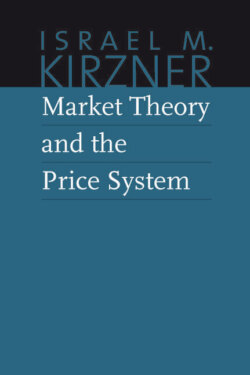Читать книгу Market Theory and the Price System - Israel M. Kirzner - Страница 14
На сайте Литреса книга снята с продажи.
THE FOUNDATIONS OF MARKET THEORY
ОглавлениеThe construction by economists of the body of propositions that make up market theory is founded upon their consciousness of the existence and the nature of economic law. The recognition of “laws” in economic affairs implies the understanding that apparent chains of causation prevail in social events, just as in the physical world. Acts of individuals in the market are perceived as taken in consequence of definite acts, prior or anticipated, of other individuals. What goes on in the market at any one time is to be ascribed to what has gone on in the past, or to past anticipations as to what will go on in the future. Market phenomena do not emerge haphazardly in a vacuum; they are understood to be uniquely “determined” by market forces.
While the essential concept of a law of economics is thus quite parallel to that of a law of physical nature, the two kinds of law have little further in common. Laws of physical nature are inferred from the observation of sequences of physical events. Economic laws, as we shall see, are founded on our understanding of the influence that a given event will have upon the actions of individuals.
To be sure, the laws of physical nature are also operative in the spheres of human activities. A heater raises room temperature, and ice lowers the temperature in the ice box; human beings are more comfortable at some temperatures than at others, and food keeps better at some temperatures than at others. These physical, physiological, or biological laws must be considered in any attempt to “explain” why men buy heaters or ice. The recognition of economic law involves the insight that, even after the physical, physiological, and psychological sciences have been utilized to the utmost in tracing the influences that have helped determine an economic “event,” there still remain significant elements that have not been traced back to prior causes. These elements, in the absence of an economic theory, would have to be considered as undetermined by any causal forces. The recognition of economic law means the perception of determinate causal chains constraining the course of events insofar as these are left undetermined by physical, physiological, or psychological laws.
Consider, for example, the consequences upon the price of ice of a sudden sharp reduction in the quantity available for sale. The most complete application of the physical sciences (while it might throw a great deal of light on why such a reduction in the supply has occurred, or upon the possible alternative ways consumers might be able to do without ice) can in itself tell us nothing about why subsequent ice purchases are carried out at higher prices. Our explanation of the higher prices being the consequence of the reduced supply thus invokes the concept of economic laws, which we understand as explaining the result of the particular change that has occurred when other aspects of the situation have remained unchanged.
The nature and existence of economic law, and its manifestation in the interplay of market forces, must now be briefly traced back to the actions of the individual human being.
